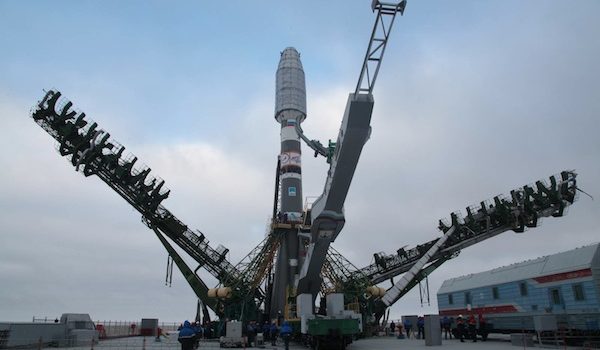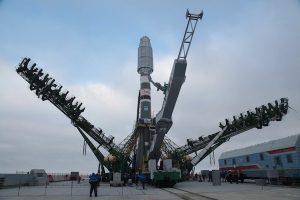

Soyuz-2.1a on the launch pad at Baikonour. The launch, originally scheduled for February 5, was postponed due to weather condition at high altitude (Credits: Roscosmos).
The Russian Federal Space Agency (Roscosmos) has announced that a Soyuz-2.1a has successfully lifted off from Baikonur Cosmodrome carrying 6 Globalstar-2 low-orbit communication satellites, on February 6.
The launch was originally intended for February 5, but it was postponed due to high winds occurring at an altitude of 8 to 10 km. This is the first launch of 2013 from Baikonour.
According to the flight plan, the launch had a nominal duration of 1 hour and 40 minutes. The satellites were separated from the Fregat upper stage in a 2-step process after 1 hour and 30 minutes, while the Fregat itself was separated from the Soyuz third stage approximately 10 minutes after launch. The Soyuz-2.1a used for this mission is the same medium-lift vehicle model employed by Arianespace in operations at the European spaceport in French Guyana. The satellites each have a mass of 700 kg, and are destined for a circular phasing orbit at appreoximatley 900 km, at a 52 degree inclination.
Globalstar is a low-Earth orbit satellite-based telecommunication system developed by US-based Loral Corporation and Qualcomm Inc., providing mobile voice and data service to over 120 countries. The 6 spacecraft launched with the Soyuz-2.1a will complete the second-generation of Globalstar satellites, reaching a number of 24 spacecraft in orbit. The first-generation of Globalstar was put into orbit in 1999. The second-generation had to wait until October 2010 before the beginning of their launch campaign. The service life expectation of Globalstar-2 is 15 years, which is twice that of the first generation system.
Globalstar-2 satellites are manufactured by Thales Alenia Space and are fitted with 16 C-band and S-band transponders. The launch has been operated by Arianespace’s Starsem affiliate, which had already completed 3 similar missions with Soyuz rockets carrying second generation Globalstar satellites in October 2010, July 2011 and December 2011.
Below, the preparation at Baikonour for Globalstar-2’s launch:

















































































































![A trajectory analysis that used a computational fluid dynamics approach to determine the likely position and velocity histories of the foam (Credits: NASA Ref [1] p61).](http://www.spacesafetymagazine.com/wp-content/uploads/2014/05/fluid-dynamics-trajectory-analysis-50x50.jpg)



Leave a Reply